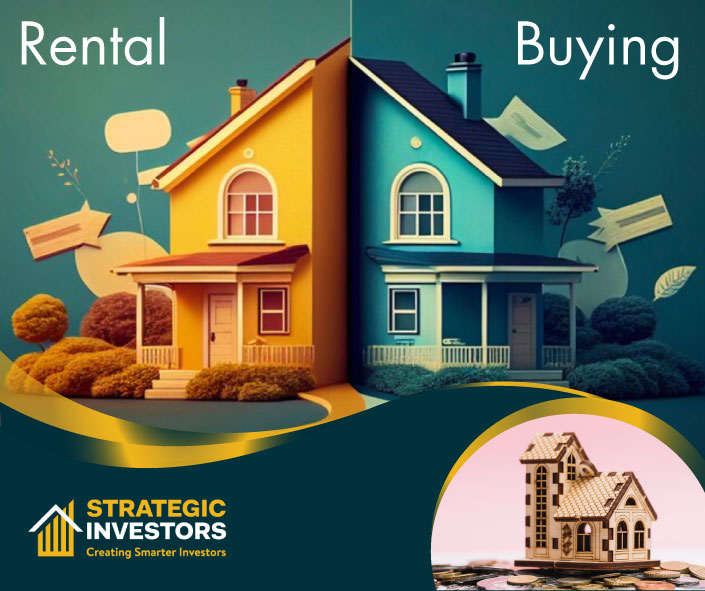
Are you contemplating the “rental vs buying” decision for your next home in Australia?
With property prices and rental costs continuously fluctuating, it’s crucial to make an informed decision that aligns with your financial and personal goals.
In this comprehensive guide, we will explore various aspects of rental vs buying, helping you weigh the pros and cons and make the best decision for your unique situation.
Short Summary
- Renting vs Buying debate should be considered based on the financial situation, lifestyle preferences, and future plans.
- Pros and cons of renting/buying must be evaluated to make an informed decision about one’s personal & financial situation.
- Market trends, property cycles, interest rates & timing are essential considerations when deciding between rent or buying. Rentvesting is a modern alternative offering flexibility & diversification.
The Renting vs Buying Debate: Key Factors to Consider
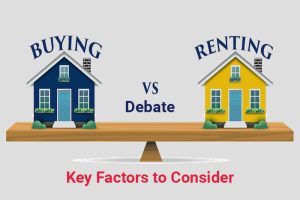
Navigating the rental market or securing a home loan requires a thorough understanding of your financial and personal situation, as well as the property markets around you. Let’s delve into these factors in more detail.
Financial Situation
Before you can decide between renting and buying, it’s critical to evaluate your financial capacity. This includes assessing your savings, income, and expenses, as well as your ability to cover monthly rental payments or mortgage repayments. Buying a property typically requires a substantial initial outlay, such as a 20% deposit and stamp duty, which can amount to a considerable sum. On the other hand, renting usually entails lower initial costs and allows you to save money for future investments or expenses.
In addition to the upfront costs, you should consider ongoing expenses associated with home ownership, such as maintenance, repair costs, and council rates. Conversely, when renting, these costs are typically covered by the landlord, allowing you to allocate your income elsewhere. It’s essential to carefully weigh your financial position and determine whether renting or buying a property aligns with your long-term financial goals.
Lifestyle Preferences
Beyond financial considerations, your lifestyle preferences play a significant role in the rent or buy decision. Renting offers flexibility and the ability to move more freely, which may be desirable if you value the freedom to change jobs, and locations, or simply seek new experiences. Additionally, as a renter, you are not responsible for maintenance and repair costs, saving you time and effort.
On the other hand, buying a property grants you:
- Stability
- The freedom to customize your living space to your liking
- A sense of personal and financial security, knowing that your home is an investment that can grow in value over time.
Ultimately, considering your personal preferences and how they align with the advantages and disadvantages of renting and buying will help you make the right choice for your lifestyle.
Future Plans
When deciding between renting and buying, it’s crucial to consider your long-term goals and plans. For example, if you plan on starting a family or changing careers, these factors may influence your decision. Purchasing real estate for the long term can maximize the likelihood of benefiting from an increase in the value of the property, offering potential financial gains.
Conversely, renting in retirement may present challenges, such as difficulty covering monthly rental payments or adjusting to rent increases. It’s essential to factor in potential lifestyle changes and plans when weighing the pros and cons of renting and buying, as these considerations can significantly impact your financial future
Pros and Cons of Renting
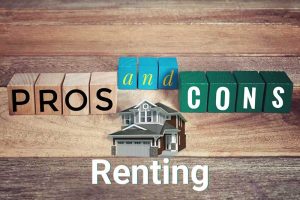
Renting can provide flexibility and freedom, as you are not tied down to a long-term contract.
Advantages of Renting
Renting offers several benefits, such as flexibility, lower upfront costs, and insulation from market fluctuations. As a renter, you have the freedom to relocate more easily and adapt to changing circumstances, such as job changes or family expansions.
Moreover, renting generally has lower initial costs than purchasing a property, allowing you to allocate funds toward other financial goals or investments. Additionally, renters are not responsible for maintenance and repair costs, council rates, or body corporate fees, as these expenses are typically covered by the landlord.
This lack of responsibility can save you time, effort, and money, making renting an attractive option for those who value flexibility and lower initial costs.
Disadvantages of Renting
Despite its advantages, renting also has its drawbacks. One major disadvantage is the lack of equity building, often referred to as “dead money”. Rental payments do not contribute to an investment for the renter, instead serving as an income source for the landlord. This means that while you are paying rent, you are not building your own wealth.
Furthermore, renting can limit your ability to customize your living space, as you are bound by the conditions of your lease agreement and the landlord’s decisions. Renters may also face potential rent increases or have to deal with property manager disputes.
Weighing the advantages and disadvantages of renting can help you determine if it’s the right choice for your financial and personal situation.
Pros and Cons of Buying
Like renting, buying a property comes with its own set of advantages and disadvantages. Understanding the pros and cons of buying can help you make an informed decision and determine if homeownership is the right path for you.
Buying a home can provide stability and security, as well as the potential for long-term success.
Advantages of Buying
One of the main advantages of buying a property is the opportunity to build equity over time. As you make regular mortgage repayments, you gradually increase your ownership stake in the property, which can grow in value and contribute to your long-term financial security. Additionally, purchasing a home comes with potential tax benefits, such as mortgage interest and property expense deductions.
Homeownership provides several advantages, including:
- Stability and control over your own home environment
- The ability to make modifications to your living space as desired
- Tailoring your home to your specific needs and preferences
- Putting down roots and investing in your future
These benefits make homeownership a desirable option for many people.
Disadvantages of Buying
On the flip side, buying a property comes with high upfront costs, such as the deposit, stamp duty, and other fees associated with purchasing a home. These costs can be a significant financial burden, especially for first-time homebuyers. Additionally, homeowners are responsible for ongoing expenses like maintenance, repair costs, and council rates, which can add up over time.
Another potential disadvantage of buying is the risk of depreciation in house prices, particularly if the housing market experiences a downturn. This can make selling the property more challenging and may result in financial losses.
Carefully evaluating the pros and cons of buying can help you determine if it’s the right choice for your financial and personal situation.
Market Trends and Property Cycles
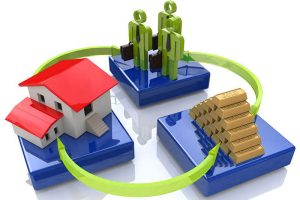
By understanding market trends and property cycles, you can make more informed decisions about when to rent or buy and maximize your financial gains.
Impact of Interest Rates
Interest rates play a crucial role in the decision to rent or buy, as they can affect both rent prices and home loan costs. When interest rates rise, landlords may increase rent to offset their own mortgage payment increases, making renting less appealing. Conversely, higher interest rates can also result in increased home loan repayments for potential buyers, making buying a property less attractive.
It’s important to monitor interest rates and consider their potential impact on your decision to rent or buy. By keeping an eye on interest rate trends, you can better anticipate changes in the rental and property markets and make informed decisions that align with your financial goals.
Timing Your Decision
Timing is crucial when entering the property market, as it can significantly influence the price of purchasing or renting a property. It’s prudent to consider the current market conditions and the likelihood of future changes when making your decision. For example, purchasing during a downturn can be advantageous, as property prices may be lower than usual.
On the other hand, renting can be a more economical option when property prices are high, allowing you to wait for more favorable buying conditions. By carefully considering market trends and property cycles, you can make well-timed decisions that maximize your financial gains and minimize potential losses.
Rentvesting: A Modern Alternative

This modern approach can provide financial flexibility and diversification while still allowing you to invest in the property market.
Benefits of Rentvesting
Rentvesting offers several advantages, such as financial flexibility, diversification, and potential rental income. By renting your primary residence and investing in a separate property, you can allocate your funds more strategically and minimize the risks associated with property ownership. This approach allows you to live in a location that suits your lifestyle while still building equity in a separate investment property.
Additionally, rentvesting can provide a steady stream of rental income from your investment property, which can help offset your rental payments or contribute to your overall wealth. By combining the benefits of renting and property ownership, rentvesting offers a modern, flexible approach to property investment.
Risks and Challenges

Navigating fluctuating market conditions and understanding the tax implications of owning an investment property can also present challenges for rentvestors. It’s essential to carefully consider the potential risks and challenges of rentvesting before diving into this modern alternative to traditional renting or buying.
Tools and Resources for Making Your Decision

Are you torn between renting or buying a home? It’s a big decision that comes with a lot of factors to consider. Luckily, there are plenty of tools and resources available to help you make the best choice for your personal and financial situation. Whether you’re looking to compare mortgage rates, calculate monthly mortgage payments, or understand the costs and benefits of renting versus owning, these resources can provide valuable insights and guidance.
By making use of such tools, you can rest assured that you’re making an informed decision that aligns with your needs and preferences.
By taking advantage of these resources, you can make an informed decision that best suits your needs.
Rent vs Buy Calculators
One useful tool for comparing the costs of renting and buying a property is a rent vs buy calculator. These calculators evaluate the long-term financial implications of purchasing a home versus renting, helping you determine which option offers greater savings based on your specific circumstances.
By entering details such as your current rent payment, home loan deposit, and approximate cost of purchasing a house in your desired area, you can gain valuable insights into the potential costs and benefits of each option.
Seeking Professional Guidance
In addition to using online tools and resources, it’s often advisable to seek professional guidance when deciding between renting and buying. Financial advisors, real estate agents, or mortgage brokers can provide tailored advice based on your personal and financial situation, helping you make an educated decision that aligns with your long-term goals.
Consulting with professionals can help you navigate the complexities of the property market, avoid costly mistakes, and ensure that you make the best decision for your financial future.
Summary
In conclusion, the decision to rent or buy a property in Australia is complex and highly dependent on your financial situation, lifestyle preferences, and future plans. By considering the various factors outlined in this comprehensive guide and utilizing the tools and resources available, you can make an informed decision that best suits your needs and sets you on the path to a prosperous financial future.
Frequently Asked Questions

Is it better for me to rent or buy?
If you anticipate staying longer, it may be worth looking into buying a property.
What are the disadvantages of buying rental property?
Additionally, rental income may fluctuate over time due to market conditions, meaning the return on investment may not always be guaranteed.
How does rentvesting work?
This approach is becoming increasingly popular, especially among younger buyers, as inner-city house prices have increased
What are the key factors to consider when deciding between renting and buying?
For those with a stable income and a desire to build equity, buying a home may be the best option. For those who prefer the flexibility of being able to move quickly or who may not be able to move quickly.
What are the main advantages of renting a property?
These advantages can make renting a great option for those who don’t want to commit to buying a home. It can also be a great way to test out a new city or neighborhood before making a long-term investment
